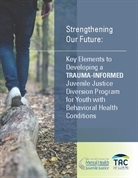Each year, more than 2 million young people become formally involved with the juvenile justice system. Up to 70 percent of those youth have at least one diagnosable mental health need, and up to 25 percent have serious emotional issues. Most youth with mental health problems involved with the juvenile justice system can be safely and effectively treated in community settings.
Models for Change worked for early identification of youth with mental health needs, diversion from the system where appropriate, and timely access to appropriate treatment. The states of Pennsylvania and Washington and the Mental Health/Juvenile Justice Action Network focused on improving identification and delivery of services to system-involved youth with mental health needs.
The Mental Health and Juvenile Justice Collaborative for Change provided training, technical assistance, and education to promote and support adoption of new resources, tools, and program models to help the field better respond to youth with mental health needs in the juvenile justice system. Models for Change developed models that meet the mental health needs of youth while avoiding unnecessary system involvement.
The website offers a web-based resource that provides materials that support youth, family, and community engagement in juvenile justice diversion programs.
- Captured the experiences of the four tribal nations in the hope that others who aim to improve behavioral health and juvenile justice services in Indian Country will find them useful
- Identified cross-site learnings from these four tribal nations
- Recommended policy and practice reforms for tribal, state, and federal agencies that are necessary to achieve successful juvenile justice transformation in Indian Country
Additionally, tribes worked individually and jointly to develop short videos that capture youth, family, and community voice within the context of the juvenile justice diversion project.
This site is a peer resource created by four teams of state and local system leaders in Nevada, New York, West Virginia, and Wisconsin as a result of their work in the 2015-16 Policy Academy-Action Network to develop pilot school-based diversion initiatives for youth with behavioral health needs
Featured publications
Initiative tools, research, knowledge, and innovations to promote reform
-
 Strengthening Our Future: Key Elements to Developing a Trauma-Informed Juvenile Justice Diversion Program for Youth with Behavioral Health Conditions
Strengthening Our Future: Key Elements to Developing a Trauma-Informed Juvenile Justice Diversion Program for Youth with Behavioral Health Conditions
- Dec 21, 2015, National Center for Mental Health and Juvenile Justice
- Diverting youth from the juvenile justice system to effective community-based services and supports will require systems that recognize and respond to trauma-related disorders. These include the…
-
 Better Solutions for Youth with Mental Health Needs in the Juvenile Justice System
Better Solutions for Youth with Mental Health Needs in the Juvenile Justice System
- Jan 22, 2014, Mental Health and Juvenile Justice Collaborative for Change
- Up to 70 percent of all youth in contact with the juvenile justice system have a diagnosable mental health disorder. Yet, the juvenile justice system is not always the best or most appropriate place…
-
 Improving Diversion Policies and Programs for Justice-Involved Youth with Co-occurring Mental and Substance Use Disorders
Improving Diversion Policies and Programs for Justice-Involved Youth with Co-occurring Mental and Substance Use Disorders
- Dec 31, 2013, National Center for Mental Health and Juvenile Justice at Policy Research Associates
- Large numbers of youth come in contact with the juvenile justice system each year. In 2009, the most recent year for which data are available, 1.9 million youth under the age of 18 were arrested. …
More publications »